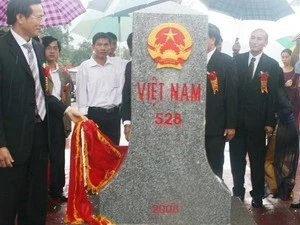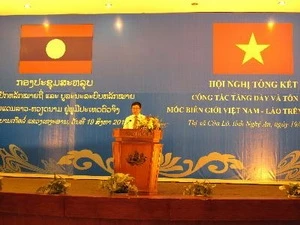Hanoi (VNA) – The stability and development of Vietnam-Laos border areas will contribute to strengthening solidarity between the two countries’ people and boosting social, economic and cultural development in border localities, said Deputy Foreign Minister Le Hoai Trung.
Trung, who is Chairman of the National Boundary Commission, made the remark during an interview recently granted to Vietnam News Agency.
The interview came as a conference reviewing the implementation of the master plan on increasing and upgrading Vietnam-Laos border markers took place in Hanoi on September 19.
Asked about major points in the settlement of Vietnam-Laos border issues, Trung said the Vietnam-Laos borderline stretches as far as nearly 2,337km, through 10 Vietnamese and 10 Lao provinces. On July 18, 1977, Vietnam and Laos concluded negotiations and signed the Convention on National Border Demarcation.
Accordingly, from 1978-1987, both sides basically completed border demarcation in the field and settled emerging issues such as the transfer of land, people and assets in line with international law. The results were hailed in the Supplementary Treaty to the 1976 Treaty on National Boundary Delimination signed on January 24, 1986 and the Protocol on border demarcation in the field and border marker planting inked on January 24, 1986 and the supplementary Protocol to the Protocol on border demarcation in the field and border marker planting signed on October 16, 1987.
Since 1987, the two sides have devised a digital Vietnam-Laos national map at a scale of 1:50,000, dealt with all discrepancies in borderline, border markers and border sections, signed the Vietnam – Laos – China and Vietnam – Laos – Cambodia border conventions.
From 2008-2016, the two countries partnered to implement the project on increasing and upgrading Vietnam-Laos border markers. There are now 1,002 border markers and posts at 905 positions, which are specified in the Protocol on Vietnam – Laos borderline and border markers signed on March 16, 2016.
Regarding main contents of two Vietnam – Laos legal documents which took effect on September 5, 2017, Trung said the Protocol on Vietnam – Laos borderline and border markers signed on March 16, 2016 featured the outcomes of border demarcation and marker planting from 1977-1987, the settlement of several demarcation differences and the implementation of a project on increasing and upgrading Vietnam-Laos border markers for 2008-2016.
The Agreement on Vietnam – Laos border and border gate management regulations comprises specific provisions regarding collaboration between the two countries’ agencies in managing and safeguarding borderline and border markers, handling border events and managing border gates to maintain security, social safety and order in border areas.
According to the official, the Vietnam – Laos border areas play a significant strategic role in the two countries’ national defence-security and socio-economic development. Therefore, ministries, agencies and localities should implement legal documents on border areas signed between the two countries in order to build a Vietnam-Laos borderline of peace, friendship, stability, cooperation and sustainable development.-VNA
Trung, who is Chairman of the National Boundary Commission, made the remark during an interview recently granted to Vietnam News Agency.
The interview came as a conference reviewing the implementation of the master plan on increasing and upgrading Vietnam-Laos border markers took place in Hanoi on September 19.
Asked about major points in the settlement of Vietnam-Laos border issues, Trung said the Vietnam-Laos borderline stretches as far as nearly 2,337km, through 10 Vietnamese and 10 Lao provinces. On July 18, 1977, Vietnam and Laos concluded negotiations and signed the Convention on National Border Demarcation.
Accordingly, from 1978-1987, both sides basically completed border demarcation in the field and settled emerging issues such as the transfer of land, people and assets in line with international law. The results were hailed in the Supplementary Treaty to the 1976 Treaty on National Boundary Delimination signed on January 24, 1986 and the Protocol on border demarcation in the field and border marker planting inked on January 24, 1986 and the supplementary Protocol to the Protocol on border demarcation in the field and border marker planting signed on October 16, 1987.
Since 1987, the two sides have devised a digital Vietnam-Laos national map at a scale of 1:50,000, dealt with all discrepancies in borderline, border markers and border sections, signed the Vietnam – Laos – China and Vietnam – Laos – Cambodia border conventions.
From 2008-2016, the two countries partnered to implement the project on increasing and upgrading Vietnam-Laos border markers. There are now 1,002 border markers and posts at 905 positions, which are specified in the Protocol on Vietnam – Laos borderline and border markers signed on March 16, 2016.
Regarding main contents of two Vietnam – Laos legal documents which took effect on September 5, 2017, Trung said the Protocol on Vietnam – Laos borderline and border markers signed on March 16, 2016 featured the outcomes of border demarcation and marker planting from 1977-1987, the settlement of several demarcation differences and the implementation of a project on increasing and upgrading Vietnam-Laos border markers for 2008-2016.
The Agreement on Vietnam – Laos border and border gate management regulations comprises specific provisions regarding collaboration between the two countries’ agencies in managing and safeguarding borderline and border markers, handling border events and managing border gates to maintain security, social safety and order in border areas.
According to the official, the Vietnam – Laos border areas play a significant strategic role in the two countries’ national defence-security and socio-economic development. Therefore, ministries, agencies and localities should implement legal documents on border areas signed between the two countries in order to build a Vietnam-Laos borderline of peace, friendship, stability, cooperation and sustainable development.-VNA
VNA























